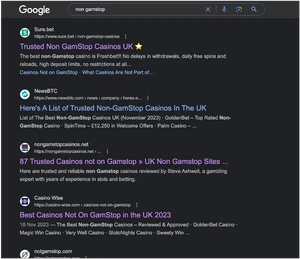Victimising the vulnerable: Criminals cracking self-exclusion

Since Yield Sec’s debut in 2022, we have found ourselves at the forefront of discussions surrounding the intricate dynamics of grey, white and black operators in the gambling ecosystem and there’s a major issue emerging around self-exclusion.
We specialise in fathoming the interplay between the legal and illegal facets of the gambling industry. This duality dilemma exists in all regulated marketplaces today.
A critical concern that has surfaced across our tech, AI and machine-learning radar is what we classify as “VV”, or vulnerability victimisation.
Vulnerability victimisation
Legal, licensed operators are prevented and regulated against inducing gambling from children and problem gamblers who have self-excluded from accessing their services.
We are all familiar with instances of breach by legal operators when they have communicated with self-excluded players. They face investigations, fines and censure from regulators as a result.
However from the view of the Yield Sec monitoring and surveillance platform these breaches by legal operators merely scratch the surface. The Yield Sec platform reveals a far more extensive, largely unmonitored landscape where illegal operators are strategically exploiting vulnerable audiences as a basic tenet of their go-to-market strategy.
At the heart of this disconcerting trend are two pivotal metrics: Cost per Acquisition (CPA) and Revenue per Player (RPP). Illegal operators navigate the acquisition landscape by targeting audiences shunned by the legal industry, effectively minimising their costs.
These operators focus on search terms related to self-exclusion loopholes. They’re harnessing a potent tool to provide betting and gaming services to vulnerable audiences at an unprecedented scale.
As a result the allure for illegal operators extends beyond acquisition to maximising revenue per player.
Yield Sec: Repairing holes in the safety net
Individuals excluded by reputable responsible gambling schemes find their only outlet with the illegal industry.
What exacerbates the situation is an absence of monitoring, safety checks and regulatory processes in these marketplaces. There’s little scope to actively see, know, value and action against the combustible harm that inevitably results when the fire of problem gambling meets the gasoline of illegal gambling operators.
We aim to offer that crucial safety net for regulators to not only monitor but actively combat potential harm. That’s because we can see the scale of the problem.
Black mirror insight: European gambling’s dark reflections
Throughout 2023, Yield Sec has closely observed the vulnerability victimisation issue in benchmark European marketplaces, revealing significant insights.
United Kingdom
Self-exclusion scheme: Gamstop
Regulator: UK Gambling Commission
Yield Sec brought attention to the active targeting of Gamstop’s audience by illegal gambling operators in January 2023. While illegal operators constitute 2% of UK market share (per Yield Sec data), this figure has surged since 2021.
Yield Sec data reveals the primary driver behind this growth is the strategic targeting of Gamstop self-excluded players. The illegal businesses use a range of channels such as search, ads, apps, sites and affiliates.
Search terms such as “Not on Gamstop”, “Non Gamstop” and “Get out of Gamstop” have played a pivotal role in this growth. It’s assisted by the shift to search by voice from consumers, resulting in vast variance across the landscape of terms and destinations that require monitoring and policing.
Since Yield Sec’s initial discussion around this issue in the UK in January 2023, the landscape has evolved dramatically. What was once a phenomenon with thousands of Google search engine results pages (SERPs) and numerous affiliates has ballooned.
Now there’s millions of search results, thousands of affiliates and hundreds of illegal operators showcasing the scale and persistence of self-exclusion circumvention.
Sweden
Self-exclusion scheme: Spelpaus
Regulator: Spelinspektionen
In Sweden, Yield Sec’s platform detected widespread instances of vulnerability victimisation across the spectrum of Spelpaus and gambling-related search terms.
Our platform’s AI and machine-learning capabilities uniquely enable it to capture audience activity and interaction, showing us growth in Sweden mirrors that of the UK.
We’ve seen notable surges during core seasonality periods. There’s the start of soccer seasons, Black Friday, Cyber Monday, not to mention the popularity of Christmas calendars within the betting and gaming offering across Sweden.
Denmark
Self-exclusion scheme: ROFUS
Regulator: Spillemyndigheden
Denmark, a mature regulated marketplace, shares similarities with the UK in terms of illegal gambling penetration targeting vulnerable audiences. Illegals in Denmark focus on children and self-excluded players, surpassing the UK in the share of the total marketplace infiltrated by illegal operators.
The majority of illegals address “workaround” schemes against ROFUS and KYC identity and payment security provisions. This creates a marketplace ecosystem that demands constant monitoring and enforcement – a void that currently exists in Denmark against criminal illegal operators.
The Netherlands
Self-exclusion scheme: CRUKS
Regulator: Kansspelautoriteit
As a recently regulated marketplace, the Netherlands grapples with the duality between legal, licensed operators and unlicensed, legacy black-market entities.
A current regulatory strategy, marked by well-publicised actions and fines against offshore illegals, appears to lack clear success in actual enforcement terms. There’s little evidence of fines actually being paid, or these companies ceasing their Dutch operations.
In this evolving market dynamic, hundreds of illegal operators exploit the nascent understanding of legal versus illegal realities, targeting self-exclusion schemes like CRUKS.
Search terms like “Niet op CRUKS” and “Zonder CRUKS” dominate illegal operator marketing and search engine optimisation strategies.
Germany
Self-exclusion scheme: Oasis
Regulator: Der Gemeinsamen Glücksspielbehörde der Länder (GGL)
Germany, another recently regulated marketplace, faced a lack of clarity before legalisation, fostering the growth of a massive illicit gambling operator spectrum.
Many unlicensed operators persisted and are now joined by new entrant illegals. A majority of illegals prioritise targeting Oasis-scheme audiences. They leverage a low-CPA, high revenue per player “guarantee” for their ads across affiliates, search and social platforms that target these vulnerable individuals.
Yield Sec’s continuous vigil in Europe
Yield Sec’s perspective on various European marketplaces reveals a disconcerting trend.
Illegal operators systematically target individuals within self-exclusion schemes, ensuring a steady influx of revenue-positive players.

Whether through performance-based affiliate arrangements with lucrative net revenue share rates or through standard pay-up-front marketing deals, the exploitation of vulnerable individuals persists as a disturbing reality.
Efforts to address this issue must extend beyond mere site or app blocking or regulatory discussions with media stakeholders such as Google. The concept of a “blocklist” or “blacklist” merely captures a historical snapshot of past transgressions. These fail to address the root problem and the need for constant monitoring, policing and enforcement.
Kicking crime out of gambling
Think of the dynamics of illegal online gambling as akin to the illicit drugs market. Stopping drug dealing on one street corner doesn’t eliminate the issue; it merely shifts the problem to new locations.
Similarly, the removal of a single destination website or app in illegal online gambling has limited impact on the overall revenue strategy employed by illegal operators. They use numerous mirrors and redirects for each and every brand.
Each online betting, gaming and lottery destination in a marketplace functions like a street corner, demanding constant vigilance in the form of monitoring, policing, and enforcement. This need persists 24/7 365 days a year.
This is precisely the solution we’re offering to regulators, exclusion scheme providers and other legal stakeholders in the gambling ecosystem. We must go beyond the good intentions of our responsible gaming policies. A proactive approach ensuring the fundamental purpose of legal gambling is realised – to replace illegal gambling – is crucial.
We’re looking to help all legal stakeholders reach higher and provide active benefits to each jurisdiction’s commerce and community. By doing so revenue, tax, onshore jobs and control will be channelled to the legal stakeholder community as illicit gambling operations are identified, reduced and removed.
This does not happen if we allow crime to take hold and prosper across our online gambling ecosystems while it harms the most vulnerable individuals in our societies.

Ismail Vali is the founder and CEO of Yield Sec. Yield Sec stands as the pre-eminent marketplace intelligence platform, catering to the diverse needs of legal stakeholders in the global landscape of online betting, gaming and lottery jurisdictions.
Find out more at YieldSec.com


